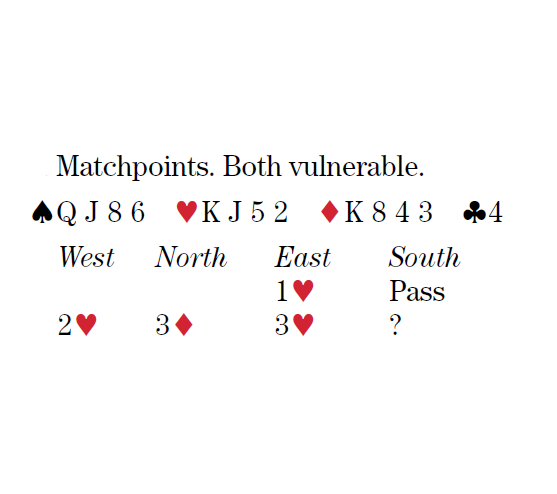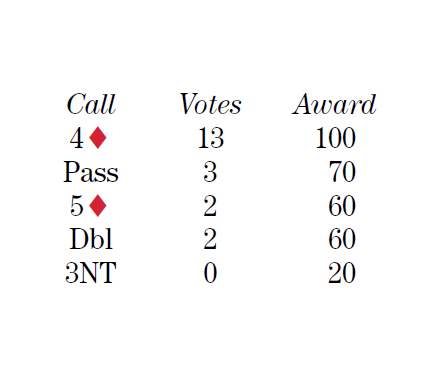
What’s your call?
| 3♠ | 3NT | |||
| 4♣ | 4♦ | 4♥ | 4♠ | 4NT |
| 5♣ | 5♦ | 5♥ | 5♠ | 5NT |
| 6♣ | 6♦ | 6♥ | 6♠ | 6NT |
| 7♣ | 7♦ | 7♥ | 7♠ | 7NT |
| Dbl | Pass |
A little leeway
We have an excellent fit with partner and we have an excellent fit with the opponents. Hmmm …
“We must raise our partner with four trumps,” insists Stack. “Let’s hope the opponents will press on with 4♥, in which case we will spring our trap
with a double.”
The Gordons, while tempted to double, bid 4♦ instead. “But we may get a chance to double 4♥,” they add with their fingers crossed.
“Boy this is a tough set!” kvetches Rigal. “4♦ — I’ll go low, assuming that partner’s action is based on short hearts, not high cards. The auction
may well not be over!”
Boehm bids 4♦ “giving partner leeway for pre-balancing with heart shortness.”
Kennedy raises to 4♦, hoping that partner — holding four spades, six diamonds and a good hand — will pause to bid 4♠ on the way to 5♦.
“4♦,” bids Meckstroth. “3NT could be the winner.”
“True, a heroic 3NT could work,” responds Sanborn, “but 5♦ could be a make when 3NT is down. I don’t have any aces, so 5♦ is too much. If ♥K J were the ace, I would bid 5♦.”
“This is another close call,” says Hampson. “I expect to make 4♦. I could try a pseudo cuebid like 3♠ or 4♣, but with so much wasted in hearts, I think I will simply raise. 3NT seems too ambitious without a prime club or spade card.”
Lawrence: “My expectation is that 4♦ will buy the hand or that LHO will bid 4♥, which I can choose to double
if I wish. If I do defend, I will lead a diamond, not my singleton club.”
Though it feels “wimpy,” Falk makes a simple raise to 4♦. “Double is risky. Even if repeated diamond forces will beat 3♥ (and when LHO has a heart honor, we may be toast anyway), partner may not figure out to continue the suit when they both show up with
a singleton diamond. Similarly, 5♦ is too much. I don’t want to punish partner for his enterprise if not everyone would bid 3♦ with his hand. If North has extras, nothing prevents him from bidding 5♦.”
Walker makes a fluid connection with her green card. “Pass as fast as ethically permitted.”
“Partner has pre-balanced on who knows what,” says Colchamiro as he passes. “Repeated diamond plays against 3♥ should produce a plus, and it is no lock that we can make 10 tricks in diamonds. I am not blinded to the possibility that the opponents have razzle-dazzled us and we can make 5♦, but that is the price of the prebalance philosophy.”
Cohen, who passes, takes a timeout for a quick Law of Total Tricks demonstration. “The LOTT suggests this is close. If partner is 6–1 in the reds, there are 18 trumps (10 diamonds, eight hearts) — probably not 18 tricks due to my heart honors, so maybe 17 tricks — which means there is a good chance that nobody can make anything past 3♦. If partner fits my spades a little and has weak clubs (♠K 10 x and ♣x x x, for example), bidding on will be right. But there is no way to know. If he has the opposite, say:
♠x x x ♥x ♦A Q J 10 x x ♣K 10 x,
then bidding on is likely wrong.”
Meyers calls it close between 4♦ and 5♦. She concludes, “My fourth diamond and ruffing value are too
much to bid only four.”
Weinstein is one of the two daring doublers. “3NT could be going down on club problems and it seems like I’ll be doing well to go plus 200 (or more). They didn’t make a game try, and I’ve got a tap suit, some stuff on the side and reasonable trumps. It won’t the last time I go minus 1130.”
The Joyces plan is to double and lead a club.

